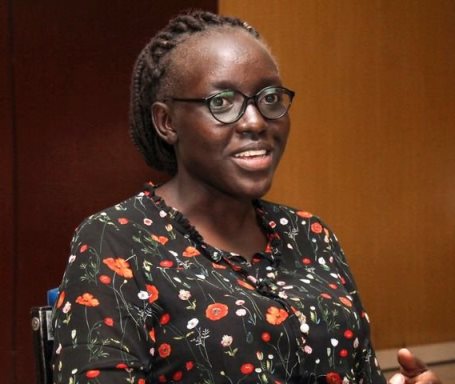
University leadership is baptism by fire
When she joined Mount Kenya University (MKU) four years ago, Joy Rachel Akinyi never imagined she would one day be at the helm of the institution’s student leadership.
What you need to know:
- Joy Rachel Akinyi was elected vice-president of Mount Kenya University Student Association (MKUSA) beating four other contestants.
- She is the only woman in a cabinet of seven members.
- Ms Akinyi says cases of pregnancies, depression and suicide increased during the Covid-19 break, forcing her to come up with weekly virtual forums where she and a team of counsellors mentor female students.

When she joined Mount Kenya University (MKU) four years ago, Joy Rachel Akinyi never imagined she would one day be at the helm of the institution’s student leadership.
As the years went on, however, the Bachelor of Economics and Statistics Fourth Year student due to graduate in August, felt the itch to lead.
Ms Akinyi, who is currently undertaking her internship at Kenya National Bureau of Statistics (KNBS) tells nation.africa that a time came when she decided to be the change she wanted to see and make a difference.
She threw her hat in the ring and was elected vice-president of Mount Kenya University Student Association (MKUSA) beating four other contestants.
Out of the 212 delegates, she says she garnered 98 votes against her closest challenger who got 76 votes. She is the only woman in a cabinet of seven members.
Barely a month into the office, Covid-19 struck interrupting her leadership journey – the government ordered all learning institutions closed.
Female students
Ms Akinyi says cases of pregnancies, depression and suicide increased during the Covid-19 break, forcing her to come up with weekly virtual forums where she and a team of counsellors mentor female students.
“The pandemic saw many students undergo a myriad of challenges. The mental health forums we hold weekly are, therefore, to help those affected with self-awareness,” she says.
Even though cases of students, mostly female, undergoing depression has greatly reduced, the student leader says many students still shun the mentorship program.
The pandemic she adds, also resulted in some students struggling with school fees since many parents lost their jobs in the process and could not pay their fees.
Ms Akinyi proposes that the government sets up a post-Covid-19 education recovery fund to help such students.
Leading a university students’ organisation can be tough, especially for young women, but this confident leader has discovered the secret of ensuring her colleagues in leadership and fellow students listen to her; to be a keen listener.
Condescending attitude
One of the leadership challenges she faces regularly, she says, is the condescending attitude of some students, especially because of her gender. Ms Akinyi names her brother, a medical doctor, and her parents as among her key supporters during the campaigns for the leadership role.
“My mum particularly encouraged me and told me to go for it, which gave me the courage and morale that I badly needed. She has been my greatest inspiration,” she adds.
On how she juggles between her leadership roles and studies, Ms Akinyi says she first attends class, then Mkusa meetings come second. Other times she delegates some roles to her colleagues, adding that her priority is to first study before serving.
She acknowledges that it is not a bed of roses for female students aspiring to lead in institutions of higher learning.
“It is normally baptism by fire with all manner of propaganda and smear campaigns and body shaming. Male students call us all sorts of names including flower girls. Cyber bullying is also rampant, forcing many female aspirants to drop out of the race,” she says.
Widened her network
Despite these challenges, she advises her female counterparts to rise to the occasion whenever an opportunity presents itself and show the world how resilient and confident they are.
Being in leadership, she says, has taught her a lot of things including self-awareness, widened her network, self-esteem and helped her to hone her public speaking skills.
Ms Akinyi has no plans to venture into politics in future but wants to be at the decision-making table where key resolutions touching on Kenyans’ lives including that of girls and women are made.
She notes that there is a need for women of integrity to rise up and take up leadership positions in the country to rescue her from the yolk of poor leadership.
The student leader says women should not be given leadership positions on a silver platter, but be given the opportunity to fight it out with men.
American talk show host Oprah Winfrey is Ms Akinyi’s role model because a lot of women can relate to her story of moving from grass to grace, which inspires her.












